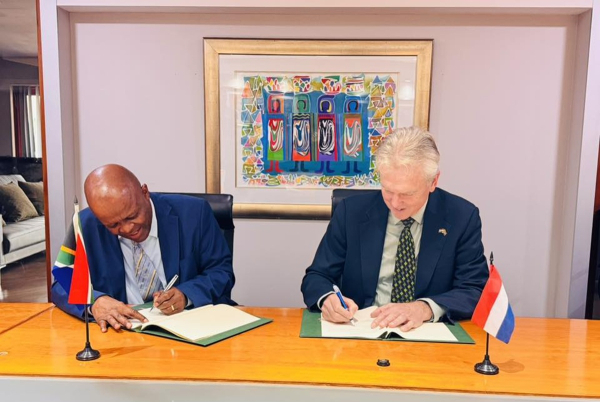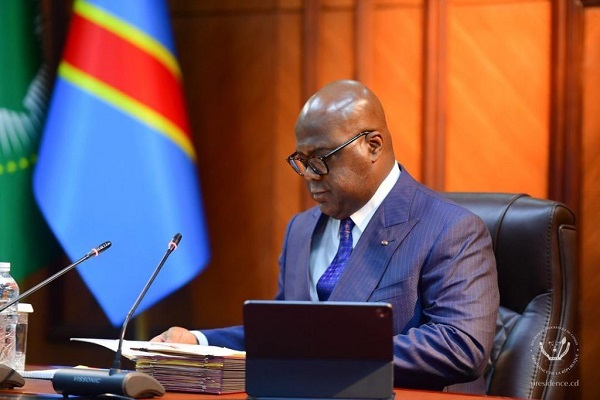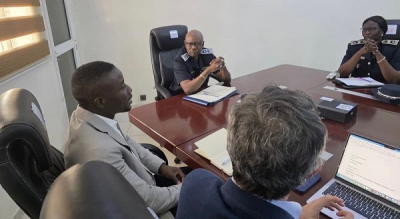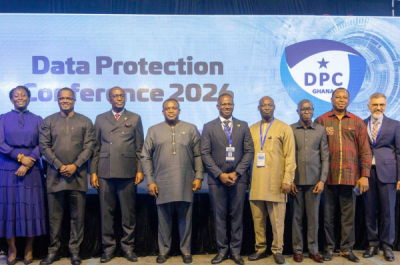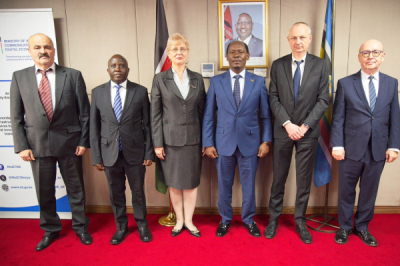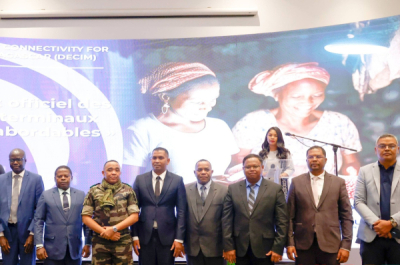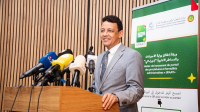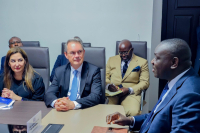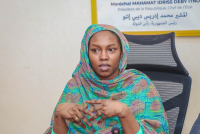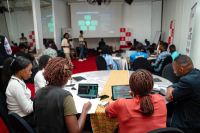
Public Management (603)
-
South Africa and the Netherlands signed a memorandum of understanding on March 3 to deepen digital cooperation.
-
South Africa ranked 40th globally and 1st in Africa in the 2024 UN E-Government Development Index with a score of 0.8616.
-
The Netherlands ranked 10th globally in the same index with a score of 0.9538 and achieved top-tier status in cybersecurity under the International Telecommunication Union index.
South Africa is exploring cooperation with the Netherlands across several digital fields to stimulate innovation and strengthen the protection of online spaces. Both parties signed a memorandum of understanding on March 3.
Officials formalized the initiative during a bilateral meeting between Mondli Gungubele, South Africa’s Deputy Minister of Communications and Digital Technologies, and a delegation from the Embassy of the Netherlands in South Africa. Participants discussed digital skills development, emerging technologies, artificial intelligence, cybersecurity, and online child protection.
This rapprochement forms part of broader efforts by African countries to accelerate digital transformation. Governments are integrating digital technologies across all sectors of the economy to support socio-economic development.
South Africa remains one of Africa’s leaders in digital transformation, particularly in public administration. The country scored 0.8616 out of 1 in the 2024 E-Government Development Index published by the United Nations. The ranking placed South Africa first among 54 African countries and 40th out of 193 countries worldwide, above the global average of 0.6382.
In cybersecurity, the International Telecommunication Union placed South Africa in the second performance tier out of five. The country achieved the maximum score of 20 in two pillars covering technical, legal, and cooperation measures. However, the organization highlighted the need to strengthen capacity-building and organizational measures.
The Netherlands ranked 10th globally in the 2024 E-Government Development Index with a score of 0.9538 out of 1. In cybersecurity, the International Telecommunication Union classified the country in the top performance tier, which represents a model to follow. The Netherlands achieved the maximum score in four of the five ITU pillars—legal, technical, organizational, and cooperation—and scored 19.22 out of 20 in capacity development.
These indicators illustrate the Netherlands’ potential expertise in supporting South Africa’s digital ambitions. However, both parties have so far signed only a memorandum of understanding. The agreement formalizes their intent to cooperate but does not yet guarantee the implementation of funded projects with a defined timeline. Observers will need to monitor the next steps to assess the partnership’s concrete impact.
Isaac K. Kassouwi
-
President Félix Tshisekedi instructed the government to strengthen regulation of social media platforms during a Feb. 27 cabinet meeting in Kinshasa.
-
Internet users in the Democratic Republic of Congo rose 64.1% to 34.7 million between 2021 and early 2026, while social media users climbed to 10.4 million, according to DataReportal.
-
The government will promote enforcement of the country’s Digital Code and require biweekly progress reports from relevant ministers.
President Félix Tshisekedi has instructed the government of the Democratic Republic of Congo (DRC) to tighten oversight of social media platforms in order to curb abuses. He issued the directive during the 80th ordinary meeting of the Council of Ministers held on Friday, Feb. 27, in Kinshasa.
The president tasked the Minister of State for Justice and Keeper of the Seals, along with the Minister of the Digital Economy, with proposing and implementing measures in coordination with relevant services to promote responsible, ethical and rational use of social media. The measures could include, where appropriate,“proportionate and lawful restrictive measures, while respecting fundamental freedoms,” according to the statement read by Augustin Kibassa Maliba, Minister of the Digital Economy.
The directive comes amid rapid growth in social media adoption alongside expanding telecommunications services, particularly internet access. DataReportal data show that the number of internet users increased from 21.14 million in 2021 to 34.7 million in early 2026, representing a 64.1% rise and an estimated penetration rate of 30.5%. Over the same period, the number of social media users rose from 4 million to 10.4 million.
Congolese authorities argue that “Far from serving exclusively positive purposes, social media increasingly constitute vectors of misinformation, public disorder, hate speech, manipulation of opinion, and incitement to division among Congolese people, thereby undermining national cohesion, public order, and social stability.”
The decision also follows persistent security challenges in several provinces. Social media platforms have become key arenas for debate on security issues.
Promoting and Enforcing the Digital Code
The presidential communication emphasized the need to promote and enforce the Digital Code, which lawmakers adopted to regulate digital platform use in the DRC. The president stated that the legal instrument already provides mechanisms to prevent, regulate and punish online abuses. However, he said authorities and the public have not sufficiently understood or applied the provisions.
The government will not limit awareness efforts to citizens. The Minister of Communication and Media will work with public and private operators to conduct ongoing public awareness campaigns. Authorities will also target magistrates under the coordination of the High Council of the Judiciary to ensure coherent and deterrent application of the law.
Beyond regulatory measures, the executive branch will invest in education. The Ministries of National Education and Higher Education will gradually integrate training modules and awareness programs on responsible digital use into school curricula. Authorities will incorporate issues related to social media and artificial intelligence into youth education.
The president has required relevant ministers to submit a detailed report every two weeks outlining actions taken, results achieved and any difficulties encountered to ensure monitoring and evaluation. However, authorities have not yet disclosed the precise implementation measures.
This article was initially published in French by Isaac K. Kassouwi
Adapted in English by Ange J.A de Berry Quenum
-
Senegal’s National Police held talks with Meta Platforms to strengthen operational cooperation on online security.
-
Authorities plan technical training for specialized cybercrime units, including the division dedicated to cybercrime.
-
The International Telecommunication Union ranked Senegal Tier 3 in its Global Cybersecurity Index 2024 with a score of 67.17/100.
Abdoul Wahabou Sall, deputy director general of Senegal’s National Police, met last week with a delegation from Meta Platforms, the parent company of Facebook, WhatsApp and Instagram. The meeting aimed to explore new avenues of cooperation on online security.
Discussions focused on protecting young people and minors on social media platforms and strengthening operational collaboration mechanisms between law enforcement and the U.S. company. “In this regard, Meta representatives reaffirmed their willingness to support the National Police through capacity-building initiatives,” the Senegalese Police said.
Authorities expect the partnership to translate into capacity-building initiatives for specialized units, particularly the cybercrime division. Meta will organize technical training sessions on its tools and dedicated law enforcement portal to improve the handling of judicial requests and the processing of flagged content.
This initiative forms part of a broader trend across Africa, where governments have expanded partnerships with digital players to address the rapid growth of online activity. Senegalese authorities have sought to adapt investigative methods to a digital environment that now lies at the core of criminal activity, as cyber fraud, online harassment and illicit content dissemination increase.
Public institutions have also faced attacks in recent months. Hackers breached the national tax platform in October. A cyberattack then targeted the Department of File Automation (DAF) in early February. The agency manages the issuance of national identity cards, passports and biometric data. The attack forced authorities to temporarily suspend the production of national identity cards.
Cooperation with digital platforms provides a critical lever to identify perpetrators and accelerate the processing of reports. This cooperation reflects a broader shift in the role of security forces, which must now operate in cyberspace as actively as they operate on the ground.
Does Senegal Have the Means to Respond?
In its “Global Cybersecurity Index 2024” report, the International Telecommunication Union assigned Senegal a score of 67.17 out of 100. The score placed the country in Tier 3, which groups countries “having scored at least 55/100 and demonstrating an initial commitment to cybersecurity. This category corresponds to countries that have taken action—assessment, adoption, or implementation of recognized measures—in a moderate number of areas or indicators.”
Since that assessment, Senegalese authorities have announced the New Deal Technologique, a $1.7 billion program designed to turn the country into a technology hub by 2034. During the program’s launch in February 2025, President Bassirou Diomaye Faye said: "We are committed to building a sovereign digital space by strengthening our cyber resilience, securing infrastructure, protecting our critical data, and gradually reducing our dependence on foreign solutions."
Adoni Conrad Quenum
-
Ghana has finalized and government-approved its National Artificial Intelligence (AI) Strategy, with an official launch expected in the coming weeks by President John Dramani Mahama.
-
The strategy rests on four pillars, including data protection and exploitation, digital infrastructure development, skills training through the “One Million Coders” program, and ethical governance.
-
The United Nations warns that AI deployment carries risks, including data bias, ethical concerns and digital divides, particularly in lower-income countries.
Ghanaian authorities have finalized the National Artificial Intelligence Strategy, which the government recently approved. Authorities expect President John Dramani Mahama to officially launch the roadmap in the coming weeks.
Samuel Nartey George, Minister of Communication, Digital Technology and Innovation, disclosed the information during his address at the National Data Protection Conference 2026 held on Thursday, February 26.
Ghana’s National AI Strategy rests on four key priorities. Authorities aim to harness and protect national data, including African genomic data, as a strategic asset. Authorities also plan to develop robust digital infrastructure and adequate computing power to support innovation and large-scale data processing. In addition, authorities intend to strengthen skills development through initiatives such as the “One Million Coders” program to build a qualified workforce in AI and cybersecurity. Finally, the strategy commits to transparent and ethical governance, supported by concrete use cases that aim to generate tangible value for all citizens.
The roadmap reflects the government’s ambition to position digital technologies as a central driver of national development. Authorities emphasize AI’s transformative potential across multiple sectors. During the launch of the Stakeholder Consultation Forum on the National AI Strategy in May 2025, Samuel Nartey George cited specific applications, including crop health forecasting in agriculture, faster diagnostics in healthcare, personalized learning in education, enhanced transport safety and strengthened surveillance for defense and border security.
The United Nations has endorsed this strategic direction. In its “E-Government Survey 2024,” the United Nations Department of Economic and Social Affairs states that artificial intelligence can optimize public sector operations. The report explains that automation of administrative tasks can increase efficiency and eliminate delays and redundancies. The report also states that AI can detect anomalies, classify data and generate precise recommendations.
However, the United Nations Department of Economic and Social Affairs highlights several potential risks. The report identifies data bias as a concern because bias can misrepresent certain groups. The report also underscores ethical, security and social concerns. In addition, the report identifies the digital divide as a major challenge for AI implementation in the public sector, particularly in middle-income, low-income and least developed countries.
Isaac K. Kassouwi
-
Kenya detected 12.5 billion cyber incidents in 2025, up 247% year-on-year.
-
Kenya explores cybersecurity cooperation with Safetech Innovations under an existing bilateral framework with Romania.
-
Kenya launched the Kenya Cyber Resilience project worth 454 million Kenyan shillings ($3.5 million).
The Kenyan government explores cybersecurity cooperation with Safetech Innovations, a Bucharest-based cybersecurity firm.
William Kabogo Gitau, Cabinet Secretary for Information, Communications and the Digital Economy, received a delegation from the company. Gentiana Serbu accompanied the delegation.
Kenya welcomes structured cooperation that strengthens our national cybersecurity posture and safeguards our digital transformation gains.
— H.E William Kabogo Gitau, E.G.H (@honkabogo) February 24, 2026
This morning at the Ministry Headquarters, I hosted a courtesy call from the delegation of Safetech Innovations, and Romanian Ambassador to… pic.twitter.com/7UhO2liwTs
On Tuesday, February 24, the minister published a statement on X. He wrote: “Our discussion focused on cybersecurity as a critical priority for Kenya, especially as we accelerate digitization across government. We discussed the protection of critical infrastructure, strengthening institutional capacity, and the need to build strong and sustainable cyber resilience frameworks.”
He added that discussions also covered research and development collaboration. He emphasized partnerships with Kenyan higher education institutions to promote knowledge transfer and experience sharing.
Kabogo stated that the engagement forms part of bilateral cooperation between Kenya and Romania under an existing memorandum of understanding. The framework promotes collaboration in key sectors such as ICT and innovation.
The talks followed the launch of the Kenya Cyber Resilience (KCR) project approximately one month earlier. Kenya implements the project in partnership with the European Union. The initiative aims to strengthen the security, resilience, and reliability of Kenya’s expanding digital ecosystem. Authorities estimate the total cost at approximately 454 million Kenyan shillings ($3.5 million).
Kenya has also strengthened cybersecurity cooperation with the United States, the United Nations, and Huawei.
In addition to regional and international partnerships, Kenya strengthens its domestic cybersecurity framework. Authorities are advancing plans to establish a National Cybersecurity Agency (NCSA) to complement existing institutions.
Kenya enforces a Data Protection Act, the Computer Misuse and Cybercrimes Act, and a National Cybersecurity Strategy covering 2022–2027.
In its 2024 Global Cybersecurity Index, the International Telecommunication Union ranked Kenya 21st globally and third in Africa.
The country achieved maximum scores in cooperation, capacity development, and organizational measures. However, the ITU indicated that Kenya must further strengthen its regulatory framework and technical measures.
Isaac K. Kassouwi
-
The government launched a subsidized sale of 664,000 digital devices, including 400,000 reserved for women and girls.
-
Authorities financed the scheme under the $24 million DECIM fund to expand affordable access to digital equipment.
-
Only 18.7% of the population used the Internet in 2024, highlighting a wide digital gap.
Officials officially launched on February 21 a national program to sell 664,000 subsidized digital devices. The program allocates 400,000 units to women and girls. The initiative seeks to expand access to digital terminals, reduce the digital divide, and strengthen sustainable digital inclusion, particularly for women and youth.
The government has structured the program around a network of nine contracted official distributors to ensure process transparency, equipment accessibility and gradual nationwide coverage, including rural areas. Authorities have integrated the initiative into the “Affordable Digital Equipment” subcomponent of the $24 million Digital and Energy Connectivity for Inclusion in Madagascar (DECIM) fund.
Authorities first unveiled the program in April 2025 as part of a broader strategy to support socio-economic development through digital transformation. The Digitization Strategic Plan (PSN) 2023–2028 frames this strategy and sets a roadmap to position Madagascar as a leading player in Africa’s digital economy. The plan emphasizes telecommunications development, e-government and digital inclusion. Authorities expect the digital sector to contribute 6% to GDP by 2028, compared with 1.5% in 2019.
However, Madagascar continues to face a pronounced digital divide. According to the International Telecommunication Union (ITU), only 18.7% of the population used the Internet in 2024. The World Bank estimates the population at 32.9 million. The GSMA notes that smartphone affordability remains a major barrier to Internet adoption, even in areas already covered by networks, despite devices now retailing for under $100.
At the same time, the scale of the initiative remains modest relative to the population still excluded from digital services. Authorities have not announced subsequent phases or a precise timeline for expansion.
Access to smartphones alone does not guarantee adoption and effective use of digital services. Network coverage also constrains inclusion. ITU data show that 2G and 3G networks covered 88.5% and 69.2% of the population respectively at end-2023. Meanwhile, 4G coverage reached 34.6% in 2024, and 5G covered only 6.12%. High Internet costs, limited digital skills, security concerns, connectivity quality and the perceived relevance of digital services for some communities further limit uptake.
Digital infrastructure can unlock productivity gains, but hardware subsidies represent only one piece of a broader structural equation that includes connectivity, affordability and trust in digital ecosystems.
Isaac K. Kassouwi
- Mauritania launches “Ijraati” portal consolidating over 800 procedures
- Platform centralizes services, supports full digitization roadmap
- Country ranks 165th in UN 2024 e-government index
The Mauritanian government launched a digital platform for administrative procedures earlier this week. Named "Ijraati," the portal consolidates more than 800 processes into a single centralized directory of administrative procedures for citizens, investors and businesses, as part of the country’s broader public administration digitization strategy.
According to the Ministry of Digital Transformation, Innovation and Modernization of Administration, "Ijraati" allows users to consult required documents, processing times and the relevant agencies. The platform also includes an administrative dashboard and tracking tools to help ensure procedures remain up to date.
At the launch workshop, Minister Ahmed Salem Ould Bede said the official launch of the national administrative procedures portal "Ijraati" marks a key step in modernizing public administration, according to the Mauritanian Information Agency (AMI).
He outlined a three-phase roadmap: centralizing all procedures on a unified national platform; continuously updating them and ensuring data reliability in coordination with relevant ministries; and fully digitizing the most frequently used services and integrating them into the "Khdamati" platform so that transactions can be completed remotely, within set deadlines and with full transparency.
Several services have been added in recent months, including student enrollment at the University of Nouakchott; the Digital Road Traffic System (SNTR); investor services such as company registration and investment code approval applications; criminal record certificates; vehicle registration documents; certificates of loss for official documents; and services from the Mauritanian Electricity Company (SOMELEC).
These efforts come as the government steps up initiatives to position digital technology as a driver of socioeconomic development. In January 2025, it launched the "Digital-Y" project, backed by four million euros in funding through a partnership with German development cooperation. The project aims to further integrate digital tools into public administration to modernize services and strengthen administrative transparency.
Mauritania currently ranks 165th globally in the United Nations’ 2024 E-Government Development Index (EGDI), with a score of 0.3491 out of 1, below both the African and global averages. Among the index’s three sub-indices, the country records its lowest score in online services, at 0.1688 out of 1.
On cybersecurity, Mauritania falls within the fourth and second-to-last tier of the International Telecommunication Union’s (ITU) Global Cybersecurity Index 2024. The ITU notes a relatively solid performance on the legislative front but identifies room for improvement at the organizational, technical, capacity-building and cooperation levels.
Availability vs. adoption
The faster rollout of digital services nonetheless raises questions about real-world uptake and whether the administration is effectively reaching the population it aims to serve. According to the ITU, 2G coverage reached 97% of the Mauritanian population in 2023. In 2022, 3G and 4G networks covered 43.9% and 34.7% of the population, respectively.
Beyond network coverage, adoption depends on access to compatible devices such as smartphones, computers or tablets. Some 56.61% of Mauritanians aged 15 and older owned a smartphone at the end of 2024, according to the World Bank.
Other factors also shape usage, including the affordability of telecom services, digital literacy, service quality and public trust in government platforms. Mauritania had approximately two million internet users at the end of December 2025, representing a penetration rate of 37.4%, according to DataReportal.
Isaac K. Kassouwi
- The government operationalized $500 million to support digital development.
- Authorities will prioritize broadband infrastructure and public service digitalization.
- The national digital plan targets $1 billion in public investment over 2026–2030.
The government of the Democratic Republic of the Congo said it operationalized $500 million in financing to accelerate digital development as part of its national strategy.
Officials announced the measure on Feb. 17 after a working session chaired by Digital Economy Minister Augustin Kibassa Maliba with a high-level delegation of experts from the World Bank and the French Development Agency.
The Ministry of Digital Economy said technical assistance programs are nearing completion to launch investments around two priority pillars.
The first pillar focuses on strengthening digital infrastructure. Authorities plan major works to connect the country’s main cities to high-speed broadband networks. The government aims to improve service quality and significantly reduce internet access costs for the population.
The second pillar targets public service digitalization and skills development. Authorities will prioritize the dematerialization of civil registry services to simplify administrative procedures and improve the reliability of public data. The program will also include training and capacity-building initiatives to support administrative transformation and enhance employability in digital professions.
The announcement follows the signing in June 2025 of financing agreements totaling $1.9 billion with the World Bank, including $400 million specifically allocated to the digital sector. The European Union has also committed €100 million, equivalent to about $117.5 million, to support the country’s efforts.
The financing forms part of broader efforts to implement the national digital transformation strategy, which authorities consider a lever for socio-economic development. To support the National Digital Plan 2026–2030 (PNN2), which the government launched in October 2025, the administration plans $1 billion in public investment over five years. Authorities have already mobilized $500 million in external support from international partners and continue to explore additional financing partnerships.
According to the GSMA, digital technologies could contribute about $4.1 billion to the Congolese economy by 2029 if the country invests heavily in key sectors such as industry and agriculture. However, the country currently ranks 179th out of 193 economies in the United Nations E-Government Development Index. The country remains below the averages for Central Africa, Africa and the global benchmark.
This article was initially published in French by Isaac K. Kassouwi
Adapted in English by Ange J.A de Berry Quenum
- Chad opened talks with Azerbaijan to digitalize transport services and infrastructure.
- Discussions covered e-documents, smart traffic management, and airport digital platforms.
- Authorities kept the partnership at the discussion stage while technical work continued.
The Chadian government explored a partnership with Azerbaijan to accelerate transport sector digitalization. The agenda dominated a meeting held on Monday, February 16, between Boukar Michel, Minister of Digital Economy, and Fatima Goukouni Weddeye, Minister of Transport, who received an official Azerbaijani delegation on mission in Chad.
The talks focused on several strategic priorities for the sector. The discussions covered the digitalization of transport documents and services, the deployment of intelligent road traffic monitoring and management systems using geolocation, and the modernization of airport platforms through integrated digital solutions. Both sides also examined advanced control, alert, and surveillance systems to strengthen security and improve operational performance.
According to Chadian authorities, “the Azerbaijani delegation presented proven technological solutions adapted to national realities and capable of effectively supporting the digital transformation of Chad’s transport sector.”
This rapprochement formed part of a broader framework to strengthen cooperation between Chad and Azerbaijan on digital transformation, which began in late January 2026 with the signing of two memorandums of understanding. Boukar Michel said the initiative aligned with the national digital transformation strategy, which aims to improve public service quality, increase transparency and administrative efficiency, strengthen the security of strategic infrastructure, and stimulate innovation and economic attractiveness.
In the transport sector, the supervising ministry had already announced, in September 2025, the launch of a large-scale project to digitalize its financially oriented administrative services. The project plans to deploy an integrated digital system that centralizes all services, including vehicle registration cards, driving licenses, transport licenses, accreditations, and the mandatory waybill.
Authorities said the proposed cooperation between Azerbaijan and Chad on transport digitalization remained at the discussion stage. However, officials said technical work would continue to identify priority projects, define a clear operational framework, and establish an implementation timeline.
This article was initially published in French by Isaac K. Kassouwi
Adapted in English by Ange J.A de Berry Quenum
- The Democratic Republic of Congo aims to train 250,000 young people in digital skills under a five-year national program.
- The government signed a memorandum of understanding with Cisco and Cybastion in September 2025 to implement the initiative.
- Authorities target digital skills as a response to youth unemployment, as young people represent more than 50% of the working-age population.
The government of the Democratic Republic of Congo announced on Monday, February 16, the completion of the first phase of trainer training in Kinshasa under a national digital upskilling program that ultimately targets 250,000 young Congolese. Authorities will now extend the project rollout to the provinces.
On February 13, 2026, the Ministry of Youth and Civic Education detailed the program framework. Five hundred young participants began a hybrid training pathway, and organizers will use a final test to select 200 top-performing candidates. Program managers will assign selected participants to three levels—Basic, Intermediate and Advanced—and will deploy them nationwide as skills multipliers.
In September 2025, the Congolese government signed a memorandum of understanding with Cisco and Cybastion to implement the program over five years. The curriculum will provide training in networking and cybersecurity, data science, programming and operating systems, technical English, digital transformation and entrepreneurship.
The ministry stated that, beyond training, “Cisco and Cybastion will support the professional integration of young people through their network of local partners, thereby creating real employment and entrepreneurship opportunities.”
The completion of the trainer training phase marks the effective launch of the broader youth training program in digital professions. Authorities view digital technology as a key driver of economic and social development and as a vehicle for job creation and youth empowerment, particularly as employment concerns persist in the country.
A 2022 study by the Ministry of Planning showed that individuals aged 15 to 29 account for 50.44% of the working-age population. The study reported a youth unemployment rate of 2.5%, compared with 1.4% for adults, and it showed that long-term unemployment affects 61.8% of young people versus 61.2% of adults. The study estimated that the country will need to create about 9.6 million jobs between 2022 and 2030 to stabilize unemployment and labor force participation rates, and nearly 35 million jobs by 2050.
Isaac K. Kassouwi
More...
-
Mozambique launched the process to draft a National Digital Transformation Strategy to expand ICT access and support inclusive growth.
-
About 80% of Mozambicans remained offline in 2024, highlighting a large digital gap, according to the ITU.
-
The government aimed to use the strategy to mobilize investment and international support while improving economic resilience.
Last week, Mozambique officially launched the process to draft the National Digital Transformation Strategy. The roadmap aimed to leverage the country’s geographic, energy, and demographic potential, while linking these assets with public digital infrastructure to promote inclusive development and strengthen economic resilience.
The authorities held the launch on February 12, during a special session of the National Conference on Digital Transformation, which took place from February 11 to 12.
According to the government, the strategy design will include regional and national consultations, the definition of a vision, priorities, and performance indicators, the setting of strategic objectives and an action plan, and the establishment of monitoring, evaluation, and governance mechanisms. The authorities said the process will conclude with a participatory validation.
“A nationally designed and owned strategy, coherent and pragmatic, can serve as a foundation to mobilize investment and international support, consolidating digitalization as a cross-cutting enabler of economic transformation, social inclusion, infrastructure development, and environmental sustainability in the country,” said Lourino Chemane, chairman of the board of the National Institute of Information and Communication Technologies (INTIC).
This initiative unfolded amid an acceleration of digital transformation across Africa, where many countries integrate ICT across sectors to support socio-economic development. Within this context, Mozambican authorities increased efforts to expand access to mobile services.
According to the International Telecommunication Union, mobile penetration reached 79.9%, while mobile internet penetration stood at 20.5%.
Mozambique ranked 177th out of 193 countries in the 2024 United Nations E-Government Development Index (EGDI), with a score of 0.2848 out of 1.
The score remained below sub-regional (0.3903), African (0.4247), and global (0.6382) averages.
In cybersecurity, the country placed in the third tier of the 2024 ITU Global Cybersecurity Index, with significant room for improvement in legal, technical, and capacity-building areas.
This article was initially published in French by Isaac K. Kassouwi
Adapted in English by Ange J.A de Berry Quenum
-
Mali now allows citizens to request criminal records and nationality certificates online.
-
The government launched two dedicated portals developed by AGETIC and the Ministry of Justice.
-
Mali ranks 173rd out of 193 countries in the UN’s 2024 e-Government Development Index.
Alhamdou Ag Ilyène, Minister of Communication, Digital Economy and Administrative Modernization, and Mamoudou Kassogué, Minister of Justice and Human Rights, officially launched the online issuance system on February 10. The reform allows citizens to submit applications and receive both documents through digital platforms without physical travel.
Authorities made the services available via two separate government portals: casiercasier.gouv.ml for criminal records and nationalitenationalite.gouv.ml for nationality certificates. Users can file requests and track application progress online.
The government developed the platform through collaboration between the Ministry in charge of Digital Affairs and Agence des technologies de l’information et de la communication (AGETIC), in partnership with the Ministry of Justice.
The initiative forms part of a broader digital rollout across government services. Authorities recently introduced additional digital solutions at the Prime Minister’s Office in the transport, health and territorial administration sectors. These measures complement existing systems, including online services for Malians in the diaspora seeking administrative documents, computerized judicial case management tools and ongoing consular service digitization projects.
However, Mali continues to face structural challenges in digital governance. According to the United Nations 2024 e-Government Development Index, the country scored 0.3005 out of 1, ranking 173rd among 193 states. The score remains below the African average of 0.4247, reflecting progress in online service delivery but persistent gaps in infrastructure and digital skills.
The dematerialization of criminal record and nationality certificate services expands Mali’s online public service portfolio. Yet authorities must address cybersecurity risks, personal data protection concerns and limited digital adoption, particularly in rural areas where connectivity and access remain uneven.
This article was initially published in French by Samira Njoya
Adapted in English by Ange J.A de Berry Quenum
- Zimbabwe, UNESCO discuss AI and digital governance cooperation
- Talks align with Smart Zimbabwe 2030 digital plan
- Zimbabwe ranks 149th in 2024 UN e-government index
Zimbabwe is exploring new areas of cooperation with UNESCO in artificial intelligence, digital transformation and digital governance following a meeting on Tuesday, Feb. 10, between ICT Minister Tatenda Mavetera (pictured, center) and Tawfik Jelassi, UNESCO's assistant director-general for communication and information.
"Our discussions covered artificial intelligence and national policy frameworks, digital transformation in the public sector, the regulation and governance of digital platforms, and the development of digital skills for both youth and adults," Jelassi said.
Mavetera highlighted the transformative role of AI and emerging technologies in government operations and national development, stressing the importance of research, innovation and collaboration with academic and technical institutions to foster sustainable technological solutions.
The engagement aligns with Zimbabwe's digital transformation ambitions. Through the "Smart Zimbabwe 2030 Master Plan," the government aims to fully integrate ICTs across society and all economic sectors to drive rapid and sustainable socio-economic development. The plan references an International Telecommunication Union study showing that a 10% increase in a country's digitalization score leads to a 0.75% rise in GDP per capita.
Artificial intelligence is positioned as a key catalyst in this strategy, with potential to boost efficiency, drive innovation and improve services across sectors from agriculture and health to education and public administration. The recent UNESCO collaboration has focused on AI, with the organization helping to develop Zimbabwe's national strategy and assess the country's readiness.
However, an assessment report published in July 2025 notes that to fully harness AI's potential, Zimbabwe must establish a comprehensive national strategy with a plan to address key challenges including foreign dominance and cultural imposition, loss of human autonomy, financing constraints, technical infrastructure limitations, and research capacity gaps exacerbated by brain drain.
Zimbabwe currently ranks 149th out of 193 countries in the United Nations' 2024 E-Government Development Index, with a score of 0.4481 out of 1, below the global average of 0.6382.
Isaac K. Kassouwi
- Program offers certifications in AI, cloud, cybersecurity
- Aims to address skills gap and high unemployment
Rwanda and U.S. technology company Oracle launched a national digital skills initiative on Tuesday, signing a memorandum of understanding to formalize the partnership.
The program aims to provide Rwandans with advanced digital training aligned with international standards and leading to industry-recognized certifications through Oracle Academy and Oracle University, Oracle said.
Oracle Academy will work with schools and universities, equipping teachers with updated curricula, structured teaching resources and access to enterprise-grade technologies, software tools and development platforms to improve the quality of digital education.
Oracle University will deliver specialized training and certifications via an e-learning platform in strategic fields including cloud computing, artificial intelligence, generative AI, cybersecurity, programming and enterprise systems. The goal is to equip learners with skills in demand in the job market.
The initiative comes as Rwanda, like many African countries, positions digital transformation as a key driver of socio-economic development. The International Telecommunication Union says digital skills are central to building the digital economy and form a core component of national transformation strategies.
A study published in October 2025 by the Ministry of ICT and Innovation, in partnership with the Digital Cooperation Organisation, found a gap between the skills employers seek and those taught in universities. The mismatch hampers industry, and private sector actors have called for greater academic investment in digital skills programs. Teachers and university lecturers in particular need advanced digital competencies to better prepare students for current and future labor market demands.
According to the World Bank, 230 million jobs in sub-Saharan Africa will require digital skills by 2030. The trend presents a significant opportunity in Rwanda, where unemployment remains high. The African Development Bank estimated the unemployment rate at 40.2% in 2023, citing skills mismatch as a key factor. In a 2022 study, the World Bank said about 14% of the labor force is unemployed and lacks market-relevant skills. Youth unemployment stands at nearly 21%, while around 60% of those employed work in low-productivity sectors such as subsistence agriculture, retail trade and construction.
Although the training will be delivered online and offered free of charge, effective access will depend on the availability of digital devices such as smartphones, tablets and computers, as well as internet connectivity. DataReportal said Rwanda had 5.01 million internet subscribers at the end of December 2025, representing a penetration rate of 34.2%.
Isaac K. Kassouwi


